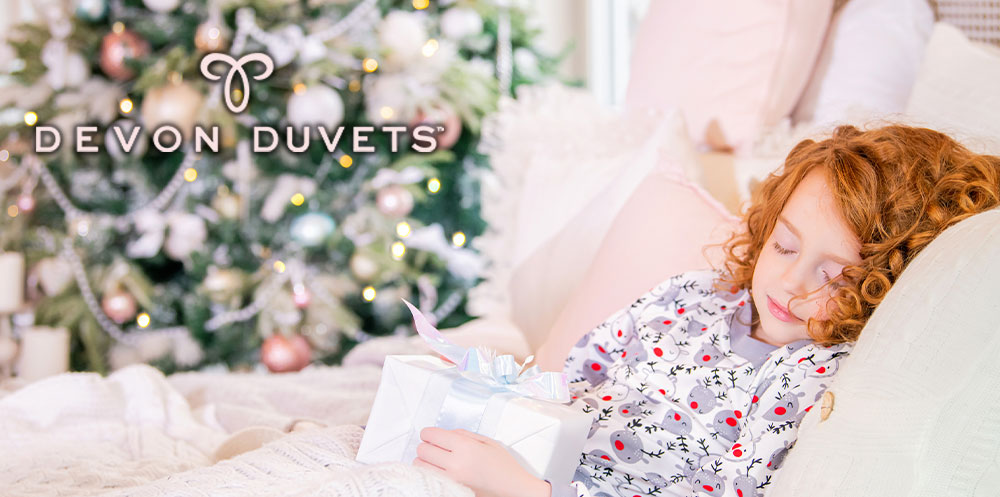How do I help my little one sleep on Christmas Eve?

The Christmas holidays is generally a very exciting time for children, with a long, steady build up from November with Christmas lights everywhere, specially targeted toy adverts on the TV and promises of visits by Santa Claus (or Father Christmas). It’s no wonder, therefore, that many children struggle to sleep on Christmas Eve, with the anticipation of presents and special treats.
Helping the kids to sleep on Christmas Eve
Check out these tips below to try and help get your littles ones to be at a reasonable hour on Christmas Eve.
- Organise plenty of activities in the morning and afternoon: By doing this, you are providing your kids something to keep their minds occupied, rather than the countdown to Christmas. Perhaps bake some Christmas cookies together or make paper snowflakes. Going for a walk in the fresh air will also help to expel some of that excess energy.
- Avoid excess sugar in the hours before bedtime: Too much sugar before bedtime makes it more likely that your kids will wake up during the night, so try foods containing sleep-inducing amino acids such as tryptophan, such as a glass of warm milk.
- Create a calm environment in the evening before bedtime: Keep the lights low and play soothing music. Try to avoid anything that is likely to increase their energy levels whereby they become overexcited and don’t want to go to bed. A calming bath will help younger kids to fall asleep faster.
- Read a bedtime story: Reading a bedtime story (even a Christmas-themed one) can help your kids feel as if they are still indulging in holiday fun whilst they drift off to sleep. The promise of a bedtime story is also a great way to coax smaller children into bed. At Devon Duvets, we have a selection of bedtime stories on our website that you can read to your little ones.
- End screen time two hours before bedtime: Encouraging older children and teens to switch off the TV and put away devices about two hours before bedtime can help boost their natural melatonin (the ‘sleep hormone’) levels. Suggest a good book (preferably not on Kindle), as reading can help them fall asleep.
What can help adults sleep better on the night before Christmas?
Adults, too, can find it difficult to get a good night’s sleep on Christmas Eve, whether that’s because the kids are awake and excited, or the thought of all the things that have to be done on Christmas Day, whether that’s preparing a delicious Christmas family meal or entertaining guests for a Christmas Day party. So here are some tips for you too!
- Avoid caffeine after lunchtime: For some of us, this is easier said than done, so if decaffeinated beverages don’t hit the spot and you need a bit of a boost then opt for hot cocoa instead of coffee or strong teas. Bear in mind that many carbonated soft drinks also contain caffeine so it’s best to avoid these too. You could also try a warm bath or shower and a soothing herbal tea just before bedtime.
- Cut down on the sugar intake: The same rules applies here as it does for kids – and for the same reasons.
- Plan ahead: You’ll feel much more relaxed if you don’t leave all the chores, such as present wrapping and food prep until the last minute on Christmas Eve. That means you can snuggle into bed and give yourself time to wind down and relax, and this will help you fall asleep.
- Stick to your usual bedtime routine: Try to go to bed at your usual time. Your body clock knows when it’s time for you to tuck up. If you usually take a warm bath, meditate or read before bedtime, then stick to that on Christmas Eve.
- Keep your sleep environment dark and quiet: Sleep in a dark room that isn’t overheated. If you are staying with relatives and are in a strange bed, this might impact on how you fall – and stay – asleep. Consider using a sleep mask or using earplugs to cut down on external distractions. Avoid using electronic devices, as the blue light will keep you up later.
How your choice of bedding can impact on your sleep
Bedding that is made with natural fibres is better than synthetic fibres that tend to trap heat and can cause overheating. In terms of temperature regulation, wool comes top of the list -and it’s also dust mite resistant! Our luxurious, individually handcrafted wool duvets are made with 100% British wool, gathered from farmers we know and who have the highest standards of animal welfare. All our wool is certified as fully traceable by British Wool.
Our wool is carefully washed without chemical treatments to retain its natural properties, and it is then needled to create soft fluffy layers. At our workshops on the edge of Dartmoor, the wool layers are hand cut, laid and stitched into a beautiful 100% cotton casing, which we make from fabric woven with cotton fibres certified by Better Cotton. At every step, our duvets are lovingly crafted by our expert seamstresses to create a cosy drape that will ease you into blissful sleep.
Does Devon Duvets make a children’s range of wool bedding?
We’ve also created a special range of wool bedding, that’s perfect for children and their delicate skin. You can find out more about our Little Lana children's wool duvets and pillows here.
If you have any questions about our products or would like help in choosing the best duvet for your or your children’s needs, then please call us on 01752 345399 or get in touch via email.


